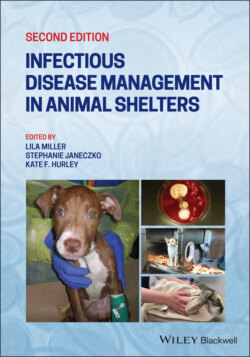Читать книгу Infectious Disease Management in Animal Shelters - Группа авторов - Страница 51
2.5.1 Vaccination
ОглавлениеThe high likelihood of exposure to disease and stress and the potentially life‐threatening consequences of illness in shelters make vaccination against certain diseases essential. There is no doubt that proper shelter vaccination protocols substantially reduce disease in the shelter and improve animal health. It is important for staff to be educated about the role and limitations of vaccines as part of wellness program training. Though they represent an essential component of a comprehensive wellness program for an animal shelter, vaccines are not “magic bullets” that can prevent disease altogether. Instead, vaccines are health products that trigger immune responses in animals and prepare them to fight future infections from disease‐causing agents; they do not treat disease or provide instant immunity. In many instances, they provide only partial protection, lessening the severity of future diseases but not preventing them. For example, canine and feline upper respiratory disease (URI) cannot be prevented by vaccination, whereas canine distemper (CDV) and canine and feline parvovirus (CPV and FPV, respectively) can be effectively prevented when vaccines are used correctly. But even so, there may be sporadic cases of CPV, FPV, and CDV in shelters, especially in young puppies and kittens due to waning maternal antibodies and the window of susceptibility to these diseases. It must also be remembered that even the best vaccines take some time to provide protection, and vaccine failure may occur when animals enter the shelter already incubating disease. Finally, it is important to recognize that vaccine failure will occur in some individuals, regardless of the protocol used, and that vaccines are not available for all diseases seen in shelters.
Guidelines developed specifically for the vaccination of cats and dogs in animal shelters have been well described by the American Association of Feline Practitioners (AAFP) (Stone et al. 2020) and the American Animal Hospital Association (AAHA) (Ford et al. 2017). Certain “core vaccines” are recommended to be administered on intake whenever possible to all cats and dogs that enter shelters. Core vaccine recommendations for shelter animals vary from the guidelines for vaccination of privately owned pets. Shelter core vaccines target diseases that represent significant morbidity and mortality, are widely distributed in shelters, and for which vaccination has been demonstrated to provide relatively good protection against disease. Core vaccines for shelter cats include parenteral feline parvovirus (FPV or panleukopenia), FHV‐1 (feline herpesvirus type 1 or feline rhinotracheitis virus), and feline calicivirus (FCV). Core vaccines for shelter dogs include parenteral vaccines against canine parvovirus (CPV), canine distemper virus (CDV), and canine adenovirus (CAV‐2, hepatitis), as well as intranasal vaccines against Bordetella bronchiseptica (Bb) and canine parainfluenza virus (CPiV). Some vaccines are not generally recommended for use in animal shelters either because of undemonstrated efficacy in the shelter setting, low risk of disease transmission within shelters, and/or delayed onset of immunity following vaccination, rendering them impractical and of limited use in a shelter setting. In addition, when the use of unnecessary vaccines is avoided, costs and potential vaccination reactions are reduced. However, veterinarians should use their professional judgment when administering vaccines; general shelter vaccination guidelines may need to be adjusted for individual shelters due to the changing prevalence of a disease in the region, increased efficacy or safety of a vaccine, development of a new vaccine, etc.
Rabies vaccination is recommended in both cats and dogs prior to adoption when a licensed veterinarian is available to administer the vaccine (or by shelter staff in accordance with state laws). New owners should be advised that rabies vaccination for dogs is mandatory in most jurisdictions, and proof of vaccination may be required for dog licensing. Rabies vaccination is also warranted when animals are housed long term in shelter facilities. Animals being held for rabies bite quarantines should be vaccinated against rabies by a licensed veterinarian in accordance with state law and the guidelines provided by the current Compendium of Animal Rabies Prevention and Control. Though the Compendium is not law, it forms the basis for many state laws regarding the management of rabies and can be accessed at http://nasphv.org/Documents/NASPHVRabiesCompendium.pdf.
For more detailed information about vaccination, please refer to Chapter 9 on Vaccinations and Immunology, Chapter 22 on Rabies, and the individual disease chapters.
